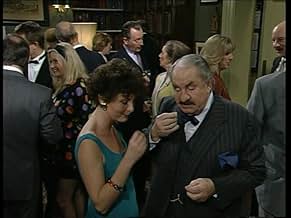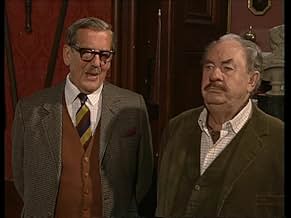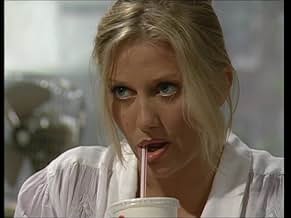NOTE IMDb
8,4/10
1,9 k
MA NOTE
Ajouter une intrigue dans votre langueThe cases of a portly and eccentric criminal law barrister.The cases of a portly and eccentric criminal law barrister.The cases of a portly and eccentric criminal law barrister.
- Nommé pour 2 Primetime Emmys
- 10 nominations au total
Parcourir les épisodes
Avis à la une
I saw 16 or so episodes of this show a long time ago, but the memories of it are enduring. While the show's tone was humorous, the legal drama was as intense and as interesting as anything on American TV. Leo McKern's Rumpole is funny and charming, but with a serious sense of vocation underneath that Falstaffian bulk. He's been sort of a hero of mine ever since. I hope PBS will re-air this series, or BBC America will air the unedited, unabridged Rumpole in the not-too-distant future.
It is hard to know who deserves the most credit for this courtroom series; author John Mortimer QC (a noted barrister himself), or actor Leo McKern.
Obviously, the series was written with the benefit of intimate knowledge of the English legal system, but almost every branch of it is portrayed very unflatteringly. Most Barristers are shown as smug and pompous, fencing with each other in Latin phrases while the defendant and jury look baffled; policemen are bent, solicitors are shady and judges are either more concerned with barristers' correct dress rather than the evidence, or sadistic and bigoted.
The seamier side of the profession is also shown; with prestigious barristers having to work from poky "chambers", at the mercy of clerks for their work ("briefs") and undervalued secretaries for their paperwork.
In such a world, a weary and introspective character such as Rumpole dominates the scene. McKern's booming delivery and range of facial expressions make this all too easy. The language is a delight, as Rumpole quotes Browning, Tennyson, Shakespeare at will. Some of the most hilarious scenes occur as lawyers take on their clients' personas and start arguing their cases with each other in the first person, in bars or restaurants.
Rumpole's home life with wife Hilda, "She who must be obeyed", is also shown as quite a caricature, as Hilda Rumpole is portrayed as having few interests beyond her husband's lowly position in the pecking order, and household cleaning agents.
Any one of the episodes makes good viewing.
Obviously, the series was written with the benefit of intimate knowledge of the English legal system, but almost every branch of it is portrayed very unflatteringly. Most Barristers are shown as smug and pompous, fencing with each other in Latin phrases while the defendant and jury look baffled; policemen are bent, solicitors are shady and judges are either more concerned with barristers' correct dress rather than the evidence, or sadistic and bigoted.
The seamier side of the profession is also shown; with prestigious barristers having to work from poky "chambers", at the mercy of clerks for their work ("briefs") and undervalued secretaries for their paperwork.
In such a world, a weary and introspective character such as Rumpole dominates the scene. McKern's booming delivery and range of facial expressions make this all too easy. The language is a delight, as Rumpole quotes Browning, Tennyson, Shakespeare at will. Some of the most hilarious scenes occur as lawyers take on their clients' personas and start arguing their cases with each other in the first person, in bars or restaurants.
Rumpole's home life with wife Hilda, "She who must be obeyed", is also shown as quite a caricature, as Hilda Rumpole is portrayed as having few interests beyond her husband's lowly position in the pecking order, and household cleaning agents.
Any one of the episodes makes good viewing.
Over the past decade I've watched The Sopranos, The Wire, Breaking Bad and The West Wing.
Rumpole stands alongside them as classic TV.
Great stories, brilliant scripts and fantastic acting.
It has that mark of a really great piece of drama in that after watching an hour long episode, I'll sit and discuss it for an hour more.
It's amazing to see, almost 40 years later, how much has changed in the UK....and how much hasn't! It may be dated in a few places, but it's universal in many many more....I imagine that it cost less to make EVERY episode of Rumpole (and there are lots!) than it did to make one episode of Breaking Bad or West Wing.
Just go watch it!
Rumpole stands alongside them as classic TV.
Great stories, brilliant scripts and fantastic acting.
It has that mark of a really great piece of drama in that after watching an hour long episode, I'll sit and discuss it for an hour more.
It's amazing to see, almost 40 years later, how much has changed in the UK....and how much hasn't! It may be dated in a few places, but it's universal in many many more....I imagine that it cost less to make EVERY episode of Rumpole (and there are lots!) than it did to make one episode of Breaking Bad or West Wing.
Just go watch it!
Rarely has television fit a role and an actor together as perfectly as Rumpole and Leo McKern. (A couple of other examples would be Vic Morrow in "Combat!" and Derek Jacobi in "I, Cladius".) The singular pleasure these episodes afford is watching McKern act as the mildly cynical, but resolutely libertarian, barrister. It is easy to see why McKern came to loathe playing the part since it is the ultimate case of typecasting. One can less think of McKern sans Rumpole than he can Connery sans Bond. Better to rewatch Rumpole than the colorless blather on Court TV.
The scripts and additional cast are good enough to make repeated watching of McKern worthwhile.
The scripts and additional cast are good enough to make repeated watching of McKern worthwhile.
The late Leo McKern had the kind of identification with John Mortimer's character that occurs rarely (other examples being David Suchet as Hercule Poirot, Raymond Burr as Perry Mason and probably Joan Hickson as Miss Marple.). In fact, I think the author agrees and said so more than once.
Hilda Rumpole, "she who must be obeyed", (the name comes from Rider Haggard's "She") is a perfect foil for Rumpole. (She was played by two actresses over the years, Peggy Thorpe-Bates 1978-83 and Marion Mathie from 1987-92) The other characters are also perfectly cast.
The stories are most enjoyable and are a fine basis for the series.
Hilda Rumpole, "she who must be obeyed", (the name comes from Rider Haggard's "She") is a perfect foil for Rumpole. (She was played by two actresses over the years, Peggy Thorpe-Bates 1978-83 and Marion Mathie from 1987-92) The other characters are also perfectly cast.
The stories are most enjoyable and are a fine basis for the series.
Le saviez-vous
- AnecdotesRumpole has a penchant for giving literary or historical nicknames to friends and foes. His wife Hilda's moniker, "She Who Must Be Obeyed," was originally applied to the title character of H. Rider Haggard's novel "She." Phyllida Trant Erskine-Brown's nickname, "Portia," is from William Shakespeare's "The Merchant of Venice." Samuel Ballard is dubbed "Soapy Sam" after Bishop Samuel Wilberforce', who is now best remembered for debating Thomas Huxley over Charles Darwin's theory of evolution, but regarded in his own time as rather a slick operator. He calls Judge Graves the "whited sepulchre", a Biblical allusion (Matthew 27).
- Citations
Horace Rumpole: She who must be obeyed!
- ConnexionsFeatured in The 33rd Annual Primetime Emmy Awards (1981)
Meilleurs choix
Connectez-vous pour évaluer et suivre la liste de favoris afin de recevoir des recommandations personnalisées
- How many seasons does Rumpole of the Bailey have?Alimenté par Alexa
Détails
Contribuer à cette page
Suggérer une modification ou ajouter du contenu manquant



































